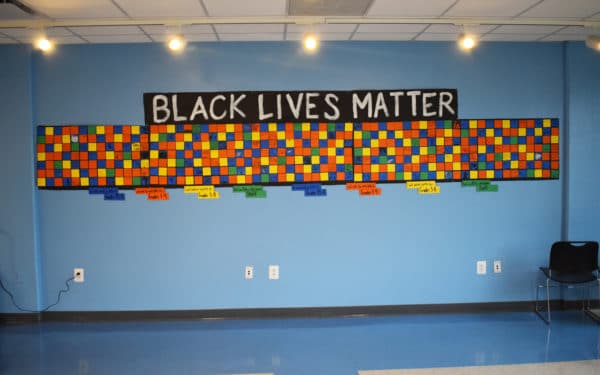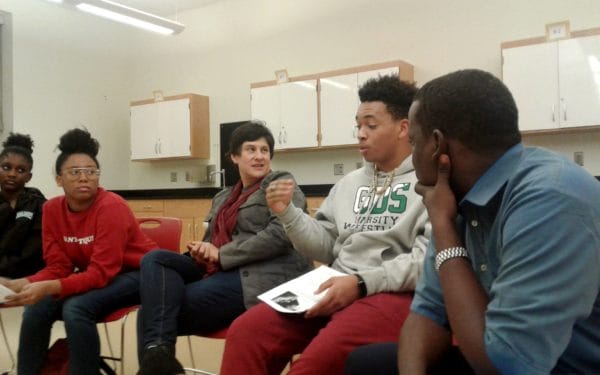The week of February 4, 2019 was an exciting time in DC area schools. In conjunction with the start of Black History Month, Center for Inspired Teaching joined forces with Teaching for Change to implement the second annual Black Lives Matter at School Week of Action in DC. LaTonia Smith Cokely, our Manager of Professional Development, and Mara Duquette, our Director of Program Administration, were kind enough to answer some questions about this initiative and to reflect on its importance.
In a city like DC with a large Black community, it seems that Black History Month would already be a high-profile event in the school calendar. Why the heightened focus on a specific week?
Black Lives Matter at School Week of Action is designed to share, promote, and enact BLM’s guiding principles to support students of color both in and out of school. The Week of Action is connected to but separate from the Black Lives Matter Movement. While Black History Month is designed to foster intentional celebration and reflection around the lives, experiences, and successes of African Americans, the Week of Action focuses on curriculum and events centered around BLM’s national demands. Demands specific to the Week of Action include ending zero tolerance policies in school, mandating Black history and ethnic studies, hiring more Black teachers, and funding counselors, not cops. We’re here to connect educators with resources and a community to help students examine, address, and grapple with issues of racism and discrimination that persist in their lives and communities.
Who initiated BLM in Schools and when? Does Inspired Teaching partner with other organizations in making this happen?
The Week of Action began in Seattle in 2016. It expanded to a few more cities in 2017, and in 2018, several other major cities including Washington, DC joined the movement. Last year, Inspired Teaching partnered with Teaching for Change to implement the first BLM at School Week of Action here in DC. We worked in conjunction with the national organizers and also locally. As a community movement, many different organizations and schools across the area participate, hosting events, sharing resources, and implementing lessons in classrooms throughout the week.
What were this year’s curriculum guidelines?
Monday: Restorative Justice, Empathy, and Loving Engagement
Tuesday: Diversity and Globalism
Wednesday: Trans-Affirming, Queer Affirming, and Collective Value
Thursday: Intergenerational, Black Families, and Black Villages
Friday: Black Women and Unapologetically Black
However, this varied from school to school, depending on grade level and how teachers chose to engage their students. For example, this is what Inspired Teaching Demonstration School did with their elementary kids:
Monday: Screen Printing
Tuesday: Trayvon Martin Memorial Day
Wednesday: “I Have the Right to Be a Child” Read-Aloud
Thursday: Black Lives Matter Banner
Friday: Poetry and Spoken Word Share
What kind of responses to this initiative have you seen?
Hundreds of educators in our community have endorsed this Week of Action through the efforts of Teaching for Change. Several organizations and politicians have formally endorsed it as well. In fact, DC Area Educators for Social Justice posted a full list of this year’s endorsers and participating schools. So overall, we’d have to say that response to the Week of Action was extremely positive.
What powerful experiences or observations can you share from this year’s Week of Action?
There are two that come to mind immediately: Speak Truth and the Open Mic.
 Speak Truth is an Inspired Teaching program designed to engage students from all over DC in honest, respectful dialogue that will expose them to a diverse array of perspectives. Last year’s Week of Action was the first time that we hosted an Intergenerational Speak Truth, and we did it again this year. It was a powerful evening, with both adults and students engaging in deep, thoughtful dialogue. Not often will adults truly listen to what teenagers have to say, and we were honored to give them an opportunity. Groups spoke on topics such as Kamala Harris’ criminal justice record, colorism, the recurrence of blackface, and allyship (supportive association with a group to which one doesn’t belong). Denisha Jones, the Director of Teacher Education at Trinity Washington University, wrote a succinct, powerful reflection about her experience at this Speak Truth event.
Speak Truth is an Inspired Teaching program designed to engage students from all over DC in honest, respectful dialogue that will expose them to a diverse array of perspectives. Last year’s Week of Action was the first time that we hosted an Intergenerational Speak Truth, and we did it again this year. It was a powerful evening, with both adults and students engaging in deep, thoughtful dialogue. Not often will adults truly listen to what teenagers have to say, and we were honored to give them an opportunity. Groups spoke on topics such as Kamala Harris’ criminal justice record, colorism, the recurrence of blackface, and allyship (supportive association with a group to which one doesn’t belong). Denisha Jones, the Director of Teacher Education at Trinity Washington University, wrote a succinct, powerful reflection about her experience at this Speak Truth event.
For the Open Mic, we partnered with Teaching for Change and the bookstore/cafe Politics and Prose to host a performance event on the theme “Ode to the Black Village.” Emceed by poet and school psychologist Carl Obeng, it quickly transformed into an open sharing between students, educators, poets, and community members. A lot of the people there had attended last year’s open mic and wanted to participate again. Our guests led and participated in robust conversations around the experiences of Black people and the purpose of the Black Village, which refers to a community whose mission is supporting one another as extended family while challenging the notion of a “standard” family structure. We believe this village exists both in and out of schools. We also believe that schools can foster it by hiring Black teachers and mandating curricula that include Black history and ethnic studies, expanding the Black Village, and supporting the growth and development of Black youth.
It was uniquely powerful to hear the thoughts and experiences of people from all age groups and backgrounds speaking intentionally about how to support Black students in schools. Because many adults are so removed from student experiences and school cultures, it’s helpful for them to hear and discuss what students and educators go through daily — specifically those who are most impacted. Through this event, we heard from students, artists, educators, and activists who are curious and passionate about ensuring that the demands voiced during BLM at Schools Week of Action are heard and met.
What changes or improvements would you like to see for next year’s Week of Action?
We want to work more closely with the DCPS Office of Equity to determine more ways we can work with them to expand usage of the curriculum and reach more teachers and students. We’d like to engage more community members in critical conversations around issues related to Black lives in DC through physical and virtual events. In the months leading up to the 2020 Week of Action, we hope to work more closely with Teaching for Change to create more opportunities for educators and community members to have these conversations yearlong as opposed to just in the first week of February. We’re also looking forward to having even more of our own Inspired Teaching alumni participate by using the BLM curriculum.
